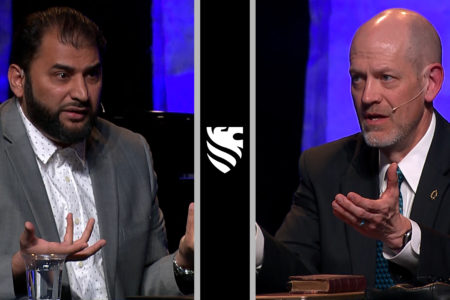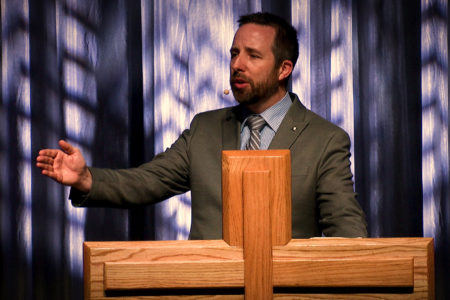Numerous attempts have been made to decipher the political framework embodied by the World Economic Forum and the United Nations, yet a crucial element in comprehending the underlying motives of these roundtable groups has often been overlooked: faith. Faith stands as the pivotal ingredient in the forthcoming system the World Economic Forum and the United Nations propose.
The collaboration between the public and private sectors within the World Economic Forum and the United Nations bears resemblance to a fascist model. Similarly, one could also identify certain communist or neo-communist traits in their policies and strategies for global influence. However, the introduction of faith as a fundamental element in the governance model introduces a crucial moral dimension, akin to a “third leg of the stool.” This incorporation of religion transforms the model from a mere manifestation of national socialism or unadulterated fascism into a form of integralism, specifically a progressive, leftist neo-integralism with enviro-communist qualities.
Integralists often refer to Constantine, who embraced Christianity as the official state religion of the Roman Empire, as a significant historical example. Others may highlight Theodosius II, who succeeded Constantine. In either case, the establishment of a unified religion throughout the empire was underway, with the aim of becoming the sole recognized formal religion in the Western world. This process gained further momentum under Justinian in the 6th century and solidified by the 9th century when Charlemagne was crowned as Imperator Romanorum.
This reign of the Holy Roman Empire was challenged by the Protestant Reformation and the violent struggle that was beginning to erupt in Weimar and other regions. This eventually led to a treaty known as the Peace of Augsburg. The treaty, negotiated on Charles’ behalf by his brother, Ferdinand, gave Lutheranism official status within the domains of the Holy Roman Empire, according to the policy of cuius regio, eius religio (whose realm, his religion).
The consequential dissemination of the Protestant Reformation can be attributed to two pivotal elements:
Firstly, the advent of the printing press revolutionized the distribution of information. With the ability to produce books and pamphlets on a large scale, ideas and beliefs could now reach a wider audience. This newfound accessibility played a crucial role in the swift propagation of Protestant teachings.
Secondly, there arose a profound curiosity among ordinary individuals to engage directly with the Bible. The desire to read and interpret the sacred text with their own eyes ignited a spark of interest that spread like wildfire. As people delved into the scriptures, they began to question established religious practices and doctrines, ultimately leading to a yearning for independence and freedom of thought.
This transformative process was not limited to Germany alone; it resonated across various regions, instilling a sense of liberation in the hearts and minds of common men and women. Consequently, this thirst for knowledge and personal knowledge sparked an intellectual enlightenment, propelling society forward in terms of both knowledge and technological advancements.
However, the period of peace was short-lived, as tensions escalated and conflicts erupted, beginning with the infamous defenestrations in Prague. These events eventually culminated in the devastating 30 Years War, a brutal conflict that claimed the lives of approximately 6 million individuals, with some variation in estimates.
Out of the ashes of the 30 Years War emerged the Peace of Westphalia, a landmark treaty that laid the groundwork for the modern nation-state. One of its key principles was Westphalian Sovereignty, which emphasized the inviolability of borders and non-interference in the internal affairs of sovereign states. This shift in the international order fundamentally altered the relationship between subjects and their rulers, granting greater autonomy and independence to individual nations.
Moreover, the Peace of Westphalia coincided with the rise of the Age of Enlightenment, a period characterized by intellectual curiosity and the pursuit of knowledge. The newfound intellectual independence fostered during this era was intertwined with the principles established by the treaty. As people began to question traditional beliefs and challenge authority, the seeds of enlightenment were sown, leading to significant advancements in various fields of study.
The Peace of Westphalia not only reshaped the political landscape but also played a pivotal role in sparking an intellectual revolution. It marked a turning point in history, paving the way for the personal pursuit of knowledge and technological progress.
The advent of the freedom of conscience brought forth influential thinkers like Locke, who championed the principles of tolerance and individual liberty. These ideas posed a direct challenge to the ruling class and the entrenched power of the Church.
The American Revolution stands as a testament to the profound impact of Enlightenment ideals. It was fueled by the very essence of what the Enlightenment had to offer: the belief in individual sovereignty, liberty, and freedom. The revolutionaries sought to establish a society where individuals could exercise their rights and govern themselves, free from the oppressive rule of monarchies and religious institutions.
The emergence of these new concepts of individual liberty and freedom of conscience posed a significant threat to the authority of the Church and monarchies worldwide. The traditional power structures, deeply rooted in religious and monarchical control, faced a formidable challenge as people began to question their legitimacy and demand their rights as autonomous individuals.
With a new-found emphasis on reason, critical thinking, and the rights of the individual, the intellectual revolution sparked a wave of intellectual and social transformation. It challenged the long-held beliefs and practices that had governed society for centuries, paving the way for the rise of democratic ideals and the recognition of human rights.
In essence, the concept of individual liberty and its revolutionary ideas posed a direct threat to the authority and control of the Church and monarchies, as they advocated for the empowerment of individuals and the dismantling of oppressive systems.
In 1864, Pope Pius IX issued The Syllabus of Errors, which can be seen as the early origins of contemporary integralism. This document served as a condemnation of various ideologies, including liberalism, modernism, moral relativism, secularization, and the political emancipation of Europe from the traditional Catholic monarchies.
Following in the footsteps of Pope Pius IX, his successor Pope Leo XIII released the encyclical Rerum Novarum. This influential document criticized what he referred to as “unrestricted capitalism.” Leo XIII also expressed concerns about the consequences of “unrestrained human liberty” in other encyclicals.
The ideas put forth by Pope Leo XIII and his predecessors found resonance and popularity in the United Kingdom, particularly through the works of G.K. Chesterton. Chesterton played a significant role in popularizing these concepts, contributing to their dissemination and influence.
These developments within the Catholic Church reflected a response to the changing social, political, and economic landscape of the time. The Church sought to address the challenges posed by liberalism, secularization, and the rise of ideologies that threatened traditional Catholic values and authority.
Overall, the Syllabus of Errors and subsequent encyclicals by Pope Leo XIII, along with the efforts of figures like G.K. Chesterton, played a role in shaping the discourse surrounding integralism and its critique of various ideologies, while also seeking to uphold Catholic principles in the face of societal transformations.
During the twentieth century, integralism emerged as a political strategy aimed at destabilizing nations and countering the rise of Marxism. This ideology, often intertwined with fascism, found its way into the political landscapes of Brazil, Italy, Vichy France, Chile, and Spain. Integralism, however, was not without its dark companions: antisemitism, authoritarianism, and a fervent desire for revolutionary change.
In a similar vein, National Socialists in Germany adopted integralist tactics to combat the spread of communism. They sought to unite churches under the banner of “the fatherland,” employing a potent blend of patriotism and a deep connection to the land to invigorate the population. This approach emphasized the importance of blood ties and a shared cultural heritage, fostering a sense of unity and loyalty among the German people.
As I had stated previously, integralism, when implemented as a system of government, nearly always manifests authoritarianism and often emerges as a rival to Marxist revolutionary models. The conventional perception of integralism typically associates it with Roman Catholic monarchical control and a right-leaning fascist dictator. However, this is not always the case. Interestingly, the World Economic Forum model drew inspiration from Dom Helder Camara, known as the “Red Bishop”of Recife, Brazil. Camara had significant involvement with the pro-Nazi Ação Integralista Brasileira political party in Brazil during the 1930s and 1940s. As integralism and fascism declined in the mid-1940s, Camara transitioned into the organization Ação Catolica Brasileira, which, in many ways, continued the integralist model in a more socialist form through a non-governmental organization. Through the mutual influence of Camara and Paulo Freire, renowned for his work “Pedagogy of the Oppressed,” and Camara’s participation in the Pact of the Catacombs during Vatican II, Camara emerged as the most influential leftist political figure in South America.
The Pact of the Catacombs was a document signed by a group of progressive Roman Catholic Bishops that included Dom Helder Camara during the Second Vatican Council, which sought to utilize the Catholic Church’s influence to bring about a new social order. The social reconstruction tool of choice that was to be implemented to bring about these changes was a form of progressive integralism.
Specifically, the Pact of the Catacombs stated:
9) Conscious of the demands of justice and charity, and their mutual relationship, we will seek to transform essential activities into social works based on justice and charity, which take into account all that this requires, as a humble service of the competent public organs.
10) We will do our utmost so that those responsible for our government and for our public services make, and put into practice, laws, structures and social institutions required by justice and charity, equality and the harmonic and holistic development of all men and women, and by this means bring about the advent of another social order, worthy of the sons and daughters of mankind and of God.
The bishops who signed the Pact of the Catacombs were driven by a desire to align the teachings of the Catholic Church with the needs and aspirations of the marginalized and oppressed. They believed that the Church had a moral obligation to actively engage in social issues and work towards the establishment of a more just and equitable society. The Pact aimed to challenge the existing power structures (capitalism and the concept of individual liberty) and promote a social order that prioritized the well-being of all individuals, particularly the poor and vulnerable (authoritarian socialism). The signatories of the Pact of the Catacombs argued that the Catholic Church, as the most powerful and influential Christian institution on earth, must address social injustices and promote social change. They believed that the Church should actively advocate for the redistribution of wealth, and challenge oppressive systems that perpetuated inequality.
The Catholic Church, with its vast resources and global reach, would now play a significant role in criticizing capitalism, advocating for social justice, and promoting human rights. In making this methodological and ideological change, the Church would now join with organizations such as the United Nations and would transition the Catholic focus of salvation into being the primary influencer of governments, institutions, and other faiths to work towards social justice and an “equitable society.”
Dom Helder Camara’s impact on the world stage grew in the late 1960s and early 1970s when he became a mentor to a young Klaus Schwab. Schwab, the founder of the WEF, who insisted on having Camara speak at the European Management Symposium, which later became the World Economic Forum, in 1974.
The swift and ongoing dismantling of our society, spearheaded by entities such as the World Economic Forum, is not solely driven by secular motives. Instead, it originates from a fusion of authoritarianism, Marxism, and a belief in the power of monarchies, resulting in a deliberate amplification of control and influence. This is what would lead Klaus Schwab, Founder of the World Economic Forum to state:
“Values cannot be justified by the intellectual process alone. Faith must be Involved.”
While discussions about integralism in political circles often focus on right-wing integralism, its greatest impact today is being felt on the left: specifically, the leftist, progressive integralism curated by Dom Helder Camara that has been proliferated by the Roman Catholic Church, the World Economic Forum, the United Nations, and recently, Protestant Evangelicalism.
It was within this era of transformational change that evangelical leaders were included in the global deconstructionist discourse, offering them a seat at the table. Over a decade ago, prominent figures within Christianity, like Rick Warren and Richard Land from the Southern Baptist Convention, were extended invitations to participate in shaping “the Role of Religion” in the Fourth Industrial Revolution at the World Economic Forum’s annual Davos summit.
Addressing the audience at Davos in 2008, Rick Warren accurately explained the integralist approach and methodology, emphasizing the need for faith leaders’ involvement to achieve the desired global transformation. Warren accurately described the World Economic Forum’s public-private plans as requiring a “third leg of the stool”: faith. This acknowledgment highlighted the significance of incorporating religious perspectives and values into the broader agenda for societal change.
Another major player in the World Economic Forum’s leftist integralism is Lippo Group Chairman, James Riady. Through his involvement in the World Economic Forum, Riady has consistently advocated for businesses to embrace their role in addressing social and environmental challenges. Riady’s initiatives, such as promoting sustainable development and supporting education programs, have showcased the positive impact that faith-inspired actions can have on the WEF’s transformational goals. By encouraging other participants at the WEF to prioritize social responsibility, Riady has contributed to an inclusive and equitable global economic agenda.
Mr. Riady’s Lippo Group played a significant role in supporting the World Economic Forum’s report titled “The Role of Faith in Systemic Global Challenges.” Within this document, Riady’s Lippo Group and other contributors propose a transformative, dialectical approach to reshape inflexible, fundamentalist religious beliefs into faiths that can embrace a more progressive, socialist, and authoritative style of governance.
During a breakout session at Davos, Mr. Riady took the lead in facilitating a thought-provoking discussion among government and corporate leaders. He posed a crucial question: “In a digitally enabled future, how can the public and private sectors forge innovative collaborations with faith communities?” The resounding answer lies in embracing a style of governance that reflects the principles of progressive integralism.
All of this being said, it should be no surprise that Mr. Riady has played a significant influential role in supporting various ministries affiliated with The Gospel Coalition and the wider Reformed Evangelical community.
The social justice movement that gained momentum within evangelicalism in recent years was not a haphazard embrace of liberal theology. Rather, it was a carefully orchestrated and effectively implemented strategy aimed at instilling a Marxian critical consciousness across various faith traditions. The ultimate goal was to foster a rejection of our constitutional republic and established way of life, in exchange for a new progressive future. The woke church movement has a clear objective of promoting critical race theory, intersectionality, standpoint epistemology, and a noticeable rejection of the constitution of the United States of America. These aims are central to their agenda.
However, in response to this dialectical “problem,” there emerged a calculated and divisive narrative that sought to exploit racial tensions, fuel anger, and promote an authoritarian ideology. This reactionary approach mirrored the tactics of the leftist Integralists, ultimately leading to a right-sided, ecumenical neo-integralism that embodied the very worst aspects of the left’s vision of evangelicalism, which they aimed to dismantle.
Our nation, our faith, and our civilization are being drawn through an alchemical process.
Alchemy and the dialectical process both rely on the fusion of opposing forces. In alchemy, the union of sulfur and mercury, representing the masculine and feminine principles respectively, is essential for transmutation. Similarly, the dialectical process necessitates the clash of opposing ideas, thesis and antithesis, to generate a synthesis that transcends the initial contradictions. This fusion of opposing forces in both alchemy and the dialectical process serves as a catalyst for transformation.
The alchemical journey at hand encompasses the essence of Hermetic fakery and Gnostic nonsense, culminating in Mr. Riady’s envisioned “digitally empowered future.” This future is governed by an autocratic framework rooted in radical subjectivity. It is imperative that we resist this path by liberating ourselves from the dialectical process, refusing to succumb to the contrived problems and orchestrated reactions. We must triumph in rejecting the proposed solutions that undermine our constitutional rights and seek to subjugate us.
Their ultimate aim is to dismantle the principles of Westphalian Sovereignty, replacing it with a hybrid of monarchical authoritarianism and cutting-edge artificial intelligence and surveillance.
We must vehemently oppose and prevent the realization of this agenda.
We must win.






Diana
EXCELLENT SYNOPSIS, ALTHOUGH I HAVE HAD CONCERNS WITH JOHN LOCKE’S THERORES IN LIGHT OF REFORMED CHRISTIAN TEACHING
Also, TIM KELLER HAS HAD THIS EFFECT IN PROTESTANT AND EVANGELICAL CHURCHES; PARTICULARLY IN IN THE PRESBYTERIAN CHURCH OF AMERICA. I ENCOUNTERED THIS MYSELF IN RECENT YEARS. LOOK AT HIS WRITINGS AND BOOKS. HE RECENTLY IS DECEASED; BUT IS ALIVE IN HIS PHILOSOPHY AND INFLUENCE. – ALSO TRINITY FOUNDATION.ORG HAS A DEEPER ANALYSIS OF HIS BACKGROUND AND BELIEFS.